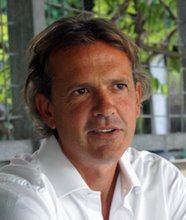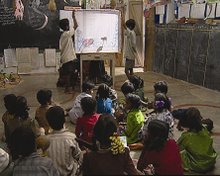At a later stage I was introduced to Mr. Rao, principal founder of the RIVER program, I spent time talking with Mr. Rao about this teaching learning methodology that he developed together with other members of his team, taking into account all specificities of rural India.
Upon my return to India I wanted to see first hand the classroom dynamics between teacher and student as well as amongst the students themselves. In Jallavaripalle I spent hours sitting in the classroom, fascinated by the enthusiasm, motivation and interest of these children in their studies. I got to know some of the children and their families. Here I saw the impact of the program on their whole community. It was at this point where I thought back to my first experience in a small fishing village. I remember sitting there next to some simple wooden fishing boats, it must have been just after twelve noon and little Prakash, a child from the village, came up to me and he sat down. I had sat with him many times before in the late afternoon, he would often stay next to me until sunset and then return home. But on this day it was too early and school was in progress. I asked him rather reproachfully why he wasn’t in school, he understood the question and he grimaced like I had never seen before. Suddenly the free and joyful boy I had enjoyed spending time with on so many occasions frowned terribly and left my company. It is only recently I have come to understand why. And like children all over the world, his reaction is an all too common response to schooling in general.
Behind those school walls where one can only imagine the uniformed children parading in and out, under the supervision of a headmaster, lies the problem, a problem that appears common everywhere and has been researched endlessly. The irony or beauty is that here we are far away in a small village called Jallavaripalle in Andhra Pradesh India. Suddenly something so distant becomes so close; close to the concerns of each of us regarding the development of our own children and therefore our own society.
Mr. Rao lives and works in Andhra Pradesh, he oversees, with his team, a program which has developed answers to many universal questions on education. They are doing it with very few resources and in the very specific context of the children. They are including as matter-of- fact the full participation of the community. This program is growing and it is not coming from the North down to the South or West to East. Like the foundation of modern India, it is homespun. And each participant is spinning his or her own success, making it their own.




1 commentaire:
Thank you so much robert sir for mention my name in your blog and i am that prakash.thank you sir.
Enregistrer un commentaire